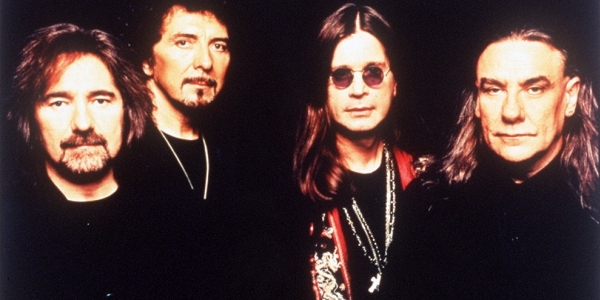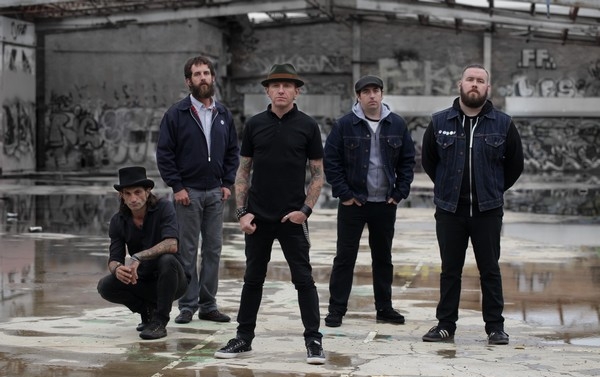“My best mate Jayden [Ensor], from Child, gave me the Paranoid vinyl to listen to when we were at school,” he says. “I was already into Led Zeppelin and Deep Purple and all that, then hearing Paranoid for the first time, it’s a whole other thing, really. It really makes you step back a bit and think, ‘Fuck.’ It’s genuinely heavy music; it’s dark and it’s got a hard edge.
“A lot of those other bands,” Wilkinson continues, “like Led Zeppelin and Deep Purple, were rocking along more on an upbeat boogie/blues-rock thing, which essentially is where Black Sabbath come from as well, but they put this darkness around it and a heaviness on it that really set them apart.”
Those tones of evil, both overt and covert, led to Black Sabbath’s reputation as the progenitors of heavy metal. Cream – another British band that were active a couple of years earlier – often get named as heavy metal antecedents as well. However, in the 2012 documentary Beware of Mr. Baker, Cream drummer Ginger Baker decreed that the “birth of heavy metal should’ve been aborted.” It’s true, Baker’s long been a belligerent eccentric so everything he says should be taken with a grain of salt, but the bottom line is that the metal designation is very divisive.
“[Black Sabbath] are a rock’n’roll band and I think they’d say the same thing,” Wilkinson says. “The same thing has been said about Motörhead as well, and [Ian] ‘Lemmy’ [Kilmister, Motörhead lead vocalist] would be the first one to say it’s rock’n’roll.”
Regardless of where Black Sabbath are appropriately categorised, we can’t deny the existence of heavy metal, and nothing comes from nothing. “Black Sabbath were the first to bring that dark tone and the lyrical content about hanging out in cemeteries in a thunderstorm and séances and all of what became metal,” Wilkinson says. “Sonically as well, the tones and the way they play – detuning guitars and it’s big and it’s fucking loud and it’s in your face – it’s heavy all ‘round.”
The Wizards lineup is completed by guitarist Daniel Firth (My Left Boot), bass player Jim Coelli (Sheriff), drummer Liam Cuffley (Matt Sonic & The High Times) and two vocalists; Matt Chapman (My Left Boot) and Jake Haugis (Dead City Ruins). After several years toiling away in the Melbourne scene, these guys have proven to be formidable rock musicians. Nevertheless, learning these tunes ain’t no walk in the park.
“There is a shitload of riffs,” Wilkinson says. “It’s crazy, but it’s amazing cutting into songs like this. You know the songs, because you’ve listened to them your whole life, and then you think of them in this light and it’s like, ‘Oh shit.’ Especially the format, the structure of the songs, it’s tricky. The way they put all their songs together, it’s super intelligent. It’s quite daunting, but when it’s all coming together, it feels fucking cool.”
The Black Sabbath reenactment will be followed by a set showcasing several subsequent Sabbath classics. Despite the challenges posed by the original compositions, the aim is to replicate them as closely as possible. Though, certain concessions must be made.
“It gets more difficult in the guitar solos,” Wilkinson says. “A lot of it’s fairly free form playing, so it’s more just to approach playing in the style that [Tony] Iommi is. We’re keeping the expression in there so it’s not just rigid. It’s got to breathe and it’s to feel natural and rock and heave like Black Sabbath does.”
Along with making sinister, bloodcurdling music, Black Sabbath – particularly frontman Ozzy Osbourne – earned a reputation for spectacularly unhinged live shows. Wilkinson remains tight-lipped about how Wizards will interpret this side of the band, but there’s plenty to learn from.
“Ozzy Osbourne was one hell of a performer,” he says. “Especially later on in the ‘70s; jumping around and frog leaps and throwing peace signs in the air and buckets of water and all that crazy shit. He really knew how to rile up an audience. I think it would’ve been amazing to be in one of those audiences, even when he was not singing, but just prowling the stage.
“Coming back to the metal mindset of things, that’s a big part of that, too; the wild show and coaxing the audience to break out of anything telling them they should be standing there appreciating a performance. Nah, fucking go crazy. Let’s all just go crazy together.”
BY AUGUSTUS WELBY







